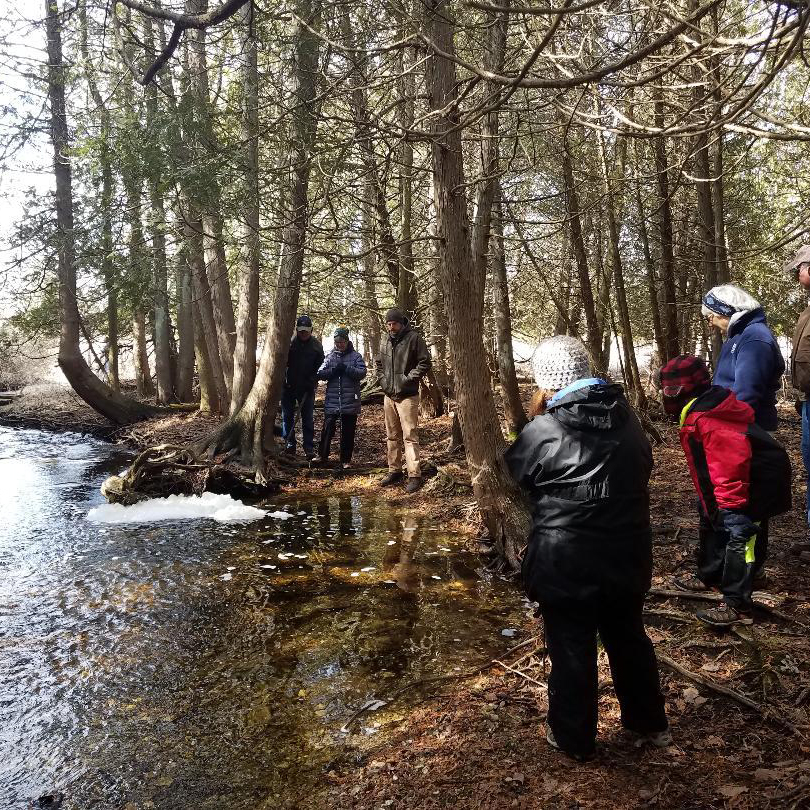By Coggin Heeringa, Interpretive Naturalist, Crossroads at Big Creek, Inc.
Sturgeon Bay, Every Day is Earth Day is an annual event celebrating the people, organizations, and businesses that uphold our sustainable culture in Door County and beyond. On Sunday, April 21 from 1:00-4:00, Crossroads at Big Creek will host the third day of the four day festival.
During the family- friendly event “Capturing the Energy of the Sun,” Crossroads and many of our partner-organizations will offer tree planting, displays, demonstrations, films, kids’ activities, guided hikes, free tree seedlings, free native wildflower seeds and educational materials, and if we are lucky, experience safe solar viewing and naturalist-led tours to see the annual sucker run.
So how does the Sun fit the 2024 Door County Every Day is Earth Day theme: “Energy-Making It and Saving It”?
One of the basic concepts of ecology is: that (almost) “all energy begins with the Sun and passes through organisms within an ecosystem.”Take, for example, planting trees. Our partners from the Door County Climate Change Coalition in collaboration with Crossroads Habitat Healers, will hold one of their Big Plants during the Crossroads event. Volunteers are invited to help plant native trees at Crossroads.
Most people realize that green leaves, through the seemingly miraculous process called photosynthesis, can capture the energy of the Sun, combine it with water and air and convert it to sugar… food.
I thought I understood the food web – that energy from the Sun is captured by plants and then animals eat plants and other animals eat them, so the energy is passed along. And in many cases, that is true. But it’s complicated.
Until I read the book, “Bringing Nature Home: How You Can Sustain Wildlife with Native Plants”, by Douglas Tallamy, I did not realize that “insects are able to eat only vegetation from plants with which they share an evolutionary history.” In other words, most native Wisconsin insects can eat only one or two species of native Wisconsin plants. All other plants are, to them, distasteful or even poisonous.
But consider that in our region, during breeding season, almost all of our songbirds feed themselves and their young with soft, juicy nutritious caterpillars. Exclusively. And most moths and butterflies lay eggs only on native plants. But even locally native plants are not equally beneficial. Research by Dr. Tallamy and his team at the University of Delaware have determined that 14% of native plants support 90% of butterfly and moth species. And that matters. Without caterpillars, there can be no baby birds. And, actually, mammals and even fish also relish caterpillars this time of year.
It becomes even more complicated with bees. Most bees – native wild bees and domestic European honeybees – will visit a variety of flowers to gather nectar, but in order to raise their young, they require high-quality pollen; pollen containing four essential amino acids from which to make protein. According to horticulturist Jarrod Fowler, “15-60% of native bees are pollen specialists which collect pollen from only 40% of regionally native plants.”
Consequently, representatives from the Door County Master Gardeners and Wild Ones-Door Peninsula will have booths at which they can help visitors learn about host plants, pick up free wildflower seeds , and perhaps most importantly, learn which locally native trees will support the greatest number of butterflies, moths, and native bees.
Researchers are just beginning to understand how the Sun’s energy becomes food in the leaves, passes through tree trunks to their roots which grow in association with fungi. The food from the trees supports vast networks of fungi which in return, help trees absorb water and nutrients, and unbelievably, enable trees to communicate with each other and to share resources.
So much to learn! So many ways to learn. And thanks to the generosity of Crossroads donors and volunteers, and our partners in conservation, learners of all ages (please bring the kids!) can enjoy the Sunday afternoon event free of charge.
Other programs at Crossroads this week include a Door County Master Gardener Program on heirloom vegetables, our weekly family program, Saturday Science, will enable learners of all ages to “Meet the Squirrels” and the League of Women Voters will present a forum aptly named “The Big Stink-A Question of Manure.”



 ALL CONTENT © 2024 BY DOOR GUIDE PUBLISHING
ALL CONTENT © 2024 BY DOOR GUIDE PUBLISHING




